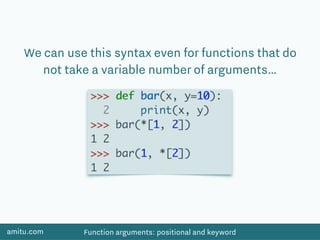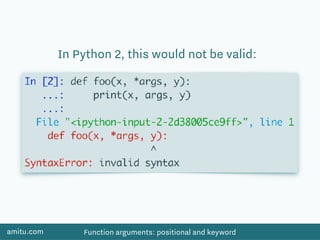Function arguments In Python
- 1. amitu.com Function arguments: positional and keyword Excerpt from Python For Programmers
- 2. amitu.com Descriptors In Python This is from a section in my “Python for Developers” book. The book covers python material for people who are already developers, even python developers. Check it out: amitu.com/python/
- 3. amitu.com Descriptors In Python In this we are going to learn about function arguments in Python Positional and Keyword arguments, * and ** syntax etc.
- 4. amitu.com Function arguments: positional and keyword Functions can take arguments when called. Here we have defined a function foo, that takes a single “positional argument”, x. When we called foo(12), 12 got assigned to x when the control was inside foo().
- 5. amitu.com Function arguments: positional and keyword We can have more than one arguments: So far so good.
- 6. amitu.com Function arguments: positional and keyword One problem with function taking many arguments is remembering the order of arguments.
- 7. amitu.com Function arguments: positional and keyword Knowing that a function add_user() exists is not enough, nor is knowing that it takes name, gender and location. You must also remember in what order those three must be supplied. How do we make such obviously wrong code look wrong?
- 8. amitu.com Function arguments: positional and keyword Sometimes your code editor can help you. But we can not always rely on that. What if you are browsing code on GitHub?
- 9. amitu.com Function arguments: positional and keyword To solve this precise problem, Python supports function calling using what is called “keyword argument” syntax: … as against “positional arguments”, eg foo(10, 20), where arguments are identified by their position.
- 10. amitu.com Function arguments: positional and keyword When using keyword arguments, you can even change the order of keyword arguments, and python will do the right thing.
- 11. amitu.com Function arguments: positional and keyword We can also mix both positional and keyword arguments: isn't Python cool?
- 12. amitu.com Function arguments: positional and keyword There is one constraint—we can not pass a positional argument after a keyword argument. If we use both, all positional arguments must come before any keyword argument.
- 13. amitu.com Function arguments: positional and keyword Default Values Next:
- 14. amitu.com Function arguments: positional and keyword In Python, we can define functions with arguments that take default values.
- 15. amitu.com Function arguments: positional and keyword We defined foo() to have default value of 10 for y. If we don't pass anything for y, python uses the default value.
- 16. amitu.com Function arguments: positional and keyword Only y has a default value, x is still a required argument.
- 17. amitu.com Function arguments: positional and keyword We can still use keyword arguments: Or a mixed arguments:
- 18. amitu.com Function arguments: positional and keyword NOTE: like we can not pass keyword arguments after positional arguments when calling function, we similarly cannot define functions with default values before arguments that do not have default values. Arguments with default values must come at the end.
- 19. amitu.com Function arguments: positional and keyword Mutable default value gotcha
- 20. amitu.com Function arguments: positional and keyword One common gotcha when using default arguments is using a mutable type as the default value. Default value for users here is a list, [ ], which is a mutable data type in Python.
- 21. amitu.com Function arguments: positional and keyword Let us say our intention is to create a users list. If it is not passed we want to use an empty list by default. We append to passed list, or the default empty list, and returned the modified list.
- 22. amitu.com Function arguments: positional and keyword So far, so good, and it seems to be working fine. Let us see when and where the problem begins. What happened here? Why is “sam” in the free_users list? add_user() should have taken default empty list, and added “richard” and returned that. Why two members?
- 23. amitu.com Function arguments: positional and keyword What is happening is that, the empty list we have used as default value of users in the function definition… … the same instance is used as value of users, every time we do not pass the second parameter. And by the second time function is called, the list is not empty any more!
- 24. amitu.com Function arguments: positional and keyword The proper way to write such a function would be using a value that would never make sense to be passed, say None or -1. ASIDE: such use of a value that is used for a special purpose is called a sentinel value.
- 25. amitu.com Function arguments: positional and keyword There is another subtle mistake we can make. Let us look at another version of add_user() to give emphasis to it. Here, we first check if the passed in value is None. We have used strong identity check (is None).
- 26. amitu.com Function arguments: positional and keyword The difference is subtle users is None vs not users. First creates a new list if nothing was passed (and we took the default value of None), other if empty list was passed.
- 27. amitu.com Function arguments: positional and keyword Yet another more reliable way to create sentinel values is:
- 28. amitu.com Function arguments: positional and keyword The reason such NotPassed is preferable over None is because our code can have None assigned to something by mistake, but getting NotPassed assigned to some variable has to be intentional.
- 29. amitu.com Function arguments: positional and keyword Variable Arguments Sometimes we want to write functions that take variable number of arguments.
- 30. amitu.com Function arguments: positional and keyword This is how we write a function in Python that takes variable number of arguments:
- 31. amitu.com Function arguments: positional and keyword Note the *args. The * indicates to Python that this function takes the variable number of positional arguments, and when the function is called, all those arguments are stored in tuple() and passed to the function by the name args. Instead of args, we could have called it anything.
- 32. amitu.com Function arguments: positional and keyword We can not treat args as a keyword argument. But we can achieve the same by * syntax:
- 33. amitu.com Function arguments: positional and keyword We have used * while calling the function. When using this syntax, we must pass an iterable. It can be a tuple, a list, or any iterable. Note that the list was converted to a tuple. Whatever you pass will get converted to tuple.
- 34. amitu.com Function arguments: positional and keyword We can use this syntax even for functions that do not take a variable number of arguments…
- 35. amitu.com Function arguments: positional and keyword … as long as the number of items we pass is correct.
- 36. amitu.com Function arguments: positional and keyword You can also mix variable arguments with positional arguments.
- 37. amitu.com Function arguments: positional and keyword Remember that we can not pass positional arguments after keyword arguments.
- 38. amitu.com Function arguments: positional and keyword In Python 2, this would not be valid:
- 39. amitu.com Function arguments: positional and keyword Python 3 accepts it, but treats y as a compulsory keyword argument.
- 40. amitu.com Function arguments: positional and keyword A variable number of arguments works with default value arguments too. … both in Python 2 and Python 3.
- 41. amitu.com Function arguments: positional and keyword But there is a possibility of ambiguity here. Python would not accept it.
- 42. amitu.com Function arguments: positional and keyword Like we have *arg syntax which tells Python to capture all remaining positional arguments, there is a similar **kw syntax that tells Python to capture all remaining keyword arguments even ones we never defined.
- 43. amitu.com Function arguments: positional and keyword Python will capture all the keyword arguments in a dict(), so everything that we know about dict() can be used with them.
- 44. amitu.com Function arguments: positional and keyword A new dictionary is constructed for you every time a function that takes variable number of keyword arguments is called.
- 45. amitu.com Function arguments: positional and keyword In this case, our function accepts no positional argument, so we can not call it with a positional argument.
- 46. amitu.com Function arguments: positional and keyword You can mix and match all forms of arguments in a single function. Just be careful that keyword arguments must come after positional ones, and there must not be any ambiguities.
- 47. amitu.com Function arguments: positional and keyword Finally, you can use the **{} syntax when calling a function too. Even when the function being called doesn't take keyword arguments…
- 48. amitu.com Function arguments: positional and keyword With these features, we can create a "universal function" that can be called with any combination of positional and keyword arguments: These play special role when we are writing generic decorators, or when we want to override a method without knowing the parent methods signature.
- 49. amitu.com Descriptors In Python Thats it for now! You have seen a section in my “Python for Developers” book. The book covers python material for people who're already developers, even python developers. Check it out: amitu.com/python/

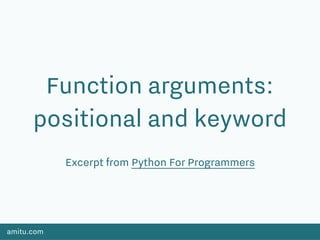








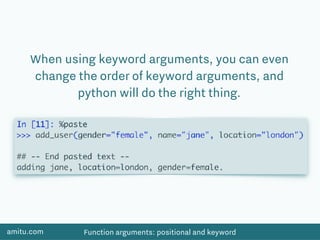



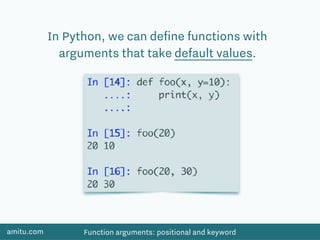





![amitu.com Function arguments: positional and keyword
One common gotcha when using default arguments is
using a mutable type as the default value.
Default value for users here is a list, [ ], which is a
mutable data type in Python.](https://image.slidesharecdn.com/function-arguments-170213031618/85/Function-arguments-In-Python-20-320.jpg)













